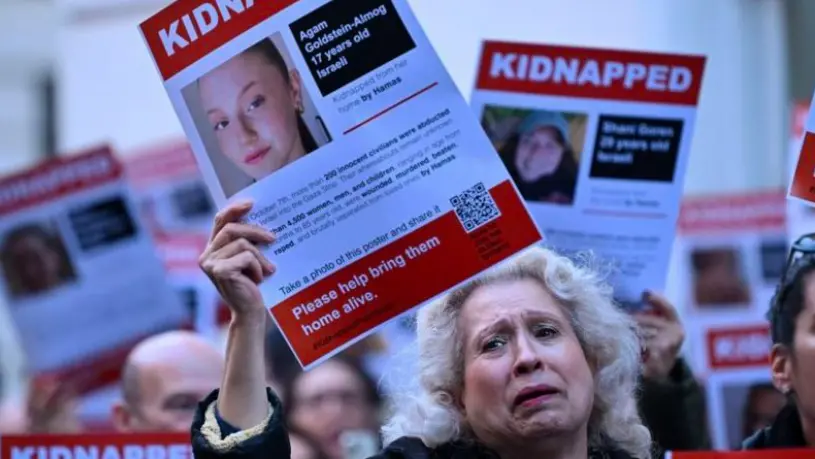Israel’s government cabinet voted Tuesday to approve a hostage swap deal with Hamas after more than six weeks of heavy fighting in Gaza.
In a statement, Israel’s prime minister’s office said 50 hostages – women and children – will be released by Hamas over the course of 4 days.
During this time there will be a truce in Israeli military actions in Gaza, the statement added.
For its part, Hamas also released a statement saying that the 50 hostages will be released in exchange for 150 Palestinian women and children being held in Israeli jails.
The deal will also allow hundreds of trucks carrying humanitarian aid, medical supplies and fuel to enter Gaza.
This “will alleviate the suffering of innocent Palestinian families in Gaza,” said U.S. President Joe Biden.
The start of the truce will be announced in the next 24 hours.
More than 50?
The Israeli government said the truce could be extended beyond the original period, adding an additional day for every 10 hostages released.
It is an important part of the deal for the hostages’ families, some of whom had said they did not want to see a partial agreement.
“The government of Israel, the IDF (Israeli military forces) and the security services will continue the war to return home all hostages, complete the elimination of Hamas and ensure that there will be no new threat to the State of Israel from Gaza,” the statement from Netanyahu’s office concludes.
There are around 230 hostages held captive in Gaza, including foreign nationals from 26 countries, according to Israeli army figures. They were kidnapped by Hamas militants during their attack on Israel last October 7, in which some 1,200 people were killed.
Israel’s air and ground attacks in Gaza since that date have left more than 14,000 dead, although the Palestinian territory’s Health Ministry said Tuesday that it lost the ability to count the dead days ago because of the destruction of the infrastructure needed to do so.
Among the victims are more than 5,000 children.
In recent days, tensions have increased between the Israeli government and the families of the hostages, some of whom have accused the authorities of not doing enough to get Hamas to release their hostages and of using the kidnappings to justify its military campaign in Gaza.
Israel published Wednesday a list of 300 Palestinians who could be released following the agreement reached with Hamas. Among them, 274 are men, mostly teenagers between 17 and 18 years old.
The list has been published because Israeli law requires that, prior to any prisoner release, Israelis must be informed with a 24-hour deadline in case they want to appeal to Israel’s Supreme Court.
This has delayed the start of the exchange.
U.S., Qatar and Egypt involved
Joe Biden celebrated the deal Tuesday, saying he was “extraordinarily pleased” that some of the hostages who have endured “weeks of captivity and unspeakable ordeal” are going to be able to be reunited with their families.
Barbara Plett, BBC correspondent for the U.S. State Department, explains that the U.S. has been intensely involved in bringing about the agreement, which is also mediated by Qatar and Egypt.
Israeli Prime Minister Benjamin Netanyahu himself credited Joe Biden with improving the terms of the agreement, so that it would have “more hostages and less costs”.
For his part, Qatari Prime Minister and Foreign Minister Mohamed bin Abdulrahman Al Thani said he hopes the deal will establish “a comprehensive and sustainable agreement” that will end “the bloodshed,” and that it will usher in “serious peace talks for a comprehensive and just peace process.”
A senior U.S. official said they expect at least three U.S. citizens, including a 3-year-old girl, to be among the hostages released in the coming days.
Speaking to reporters, he added that the girl, named Abigail, will turn 4 on Friday and that her parents were killed in the October 7 attacks by Hamas.
According to the official, Washington anticipates that the number of hostages to be released “will be more than 50, but I don’t want to give a number.”
“The way the agreement is structured greatly incentivizes the release of everyone,” he added.

